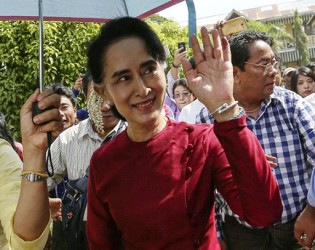YANGON/NAYPYITAW, Myanmar, (Reuters) – Supporters of Myanmar’s Aung San Suu Kyi burst into boisterous celebration yesterday after the country held its first free nationwide election in 25 years, the biggest step yet in a journey to democracy from dictatorship.

Although the outcome of the poll will not be clear for at least 36 hours, a densely packed crowd blocked a busy road beside the headquarters of Suu Kyi’s National League for Democracy in Yangon as they cheered and waved red flags.
The NLD is expected to win the largest share of votes cast by an electorate of about 30 million, who chose from thousands of candidates standing for parliament and regional assemblies.
But a legacy of military rule means Suu Kyi, who led the campaign for democracy, cannot become president herself. Whatever the result, Myanmar is heading into a period of uncertainty over how she and other ascendant parties negotiate sharing power with the still-dominant military.
A pariah state until a few years ago, Myanmar has had little experience organising elections. Some 10,000 observers were enlisted to scrutinise the process. Early indications from the monitors were that voting was mostly trouble-free, with only isolated irregularities.
“From the dozens of people we have spoken to since 6 a.m. today, everybody feels they have been able to vote for whoever they wanted to in security and safety,” said Durudee Sirichanya, one of the international observers.
In the city of Mandalay, about 100 people were stopped from voting after officials discovered they were outsiders who had been mysteriously added to the register and then bussed to the polling station.
The main concern about the election’s fairness arose before the poll. Activists estimated that up to 4 million people, mostly citizens working abroad, would not be able to vote.
Religious tension, fanned by Buddhist nationalists whose actions have intimidated Myanmar’s Muslim minority, also marred the election campaign. Among those excluded from voting were around a million Rohingya Muslims who are effectively stateless in their own land.
U.S. Secretary of State John Kerry said in a statement the election was an important step forward, but added it was “far from perfect”.
Important impediments remain to a fully democratic civilian government, Kerry said, “including the reservation of a large number of unelected seats for the military; the disfranchisement of groups of people who voted in previous elections, including the Rohingya; and the disqualification of candidates based on arbitrary application of citizenship and residency requirements.”‘





